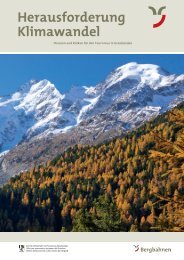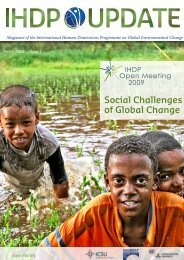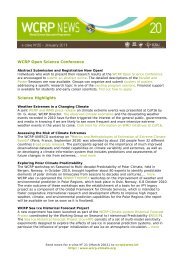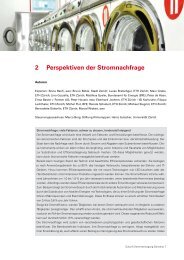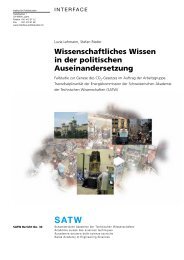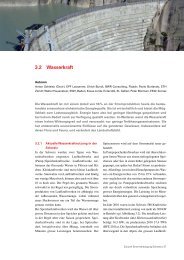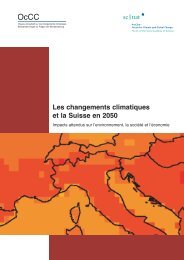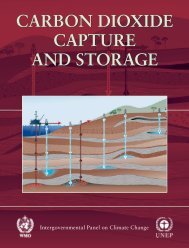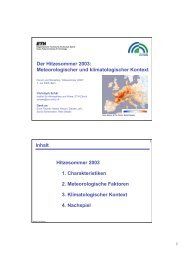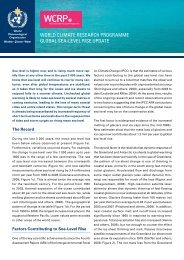Climate Change and Switzerland 2050 - OcCC - SCNAT
Climate Change and Switzerland 2050 - OcCC - SCNAT
Climate Change and Switzerland 2050 - OcCC - SCNAT
You also want an ePaper? Increase the reach of your titles
YUMPU automatically turns print PDFs into web optimized ePapers that Google loves.
<strong>Climate</strong> <strong>Change</strong> <strong>and</strong> Switzerl<strong>and</strong> <strong>2050</strong> | Urban Switzerl<strong>and</strong> 135<br />
reduction in runoff. On the other h<strong>and</strong>, climate<br />
change is a reason for an energy supply as low in<br />
CO 2 emissions as possible. Altogether, also in this<br />
scenario, the availability of resources primarily<br />
results from the politically <strong>and</strong> socio-economically<br />
shaped development.<br />
Conclusion<br />
The degree of self-sufficiency for food <strong>and</strong> energy<br />
will change for both scenarios. In contrast to the<br />
CH<strong>2050</strong> plus scenario, the degree of self-sufficiency<br />
in the CH<strong>2050</strong> eco scenario can be expected to<br />
increase slightly due to improved regional supply<br />
<strong>and</strong> altered diet. In the energy sector, the degree<br />
of self-sufficiency will increase more strongly<br />
in the CH<strong>2050</strong> eco scenario. On the one h<strong>and</strong>,<br />
climate change will affect this development by<br />
the change in water resources, <strong>and</strong> on the other<br />
h<strong>and</strong>, indirectly as a driving force behind the<br />
decarbonisation of the energy supply system.<br />
9. Development of relationships <strong>and</strong> dependencies<br />
between the Swiss urban system <strong>and</strong> the global<br />
environment<br />
<strong>Climate</strong> change is a global phenomenon. The Swiss urban system will therefore not only<br />
be affected directly but also indirectly as a result of the impacts on other parts of the<br />
world.<br />
The proportion of income that households<br />
spend on food <strong>and</strong> energy is a critical factor<br />
with regard to the future functioning of the<br />
Swiss urban system. If this proportion is also<br />
smaller than 20% in the future, the availability<br />
of resources will presumably correspond to the<br />
numbers in table 5. However, there are climate<br />
change scenarios for other regions (subtropical,<br />
arid) in which the production of agricultural<br />
goods will decrease massively due to the<br />
changed water supply. As a result, the price<br />
for food will increase exponentially <strong>and</strong> also<br />
substantially change the household budget in<br />
Switzerl<strong>and</strong>. The availability of energy from fossil<br />
deposits will hardly change as a direct result<br />
of climate change. However, should energy prices<br />
increase rapidly because of global political<br />
changes, the Swiss urban system does not yet<br />
have an alternative supply possibility. In this<br />
case, the prices could reach very high levels in<br />
countries with a low degree of self-sufficiency,<br />
i.e. level out within 10–20 years at the tenfold<br />
amount. On the other h<strong>and</strong>, the reconstruction<br />
process of the building stock (see section 6) for<br />
a CH<strong>2050</strong> eco scenario would take 30–60 years.<br />
Not until then would Switzerl<strong>and</strong> be ready for<br />
such a situation.<br />
Conclusion<br />
From today’s global political perspective, the<br />
Swiss urban system is most strongly affected by<br />
the non-sustainably oriented energy supply. This<br />
disadvantage may even increase, depending on<br />
the impact of global climate change on other<br />
regions.



